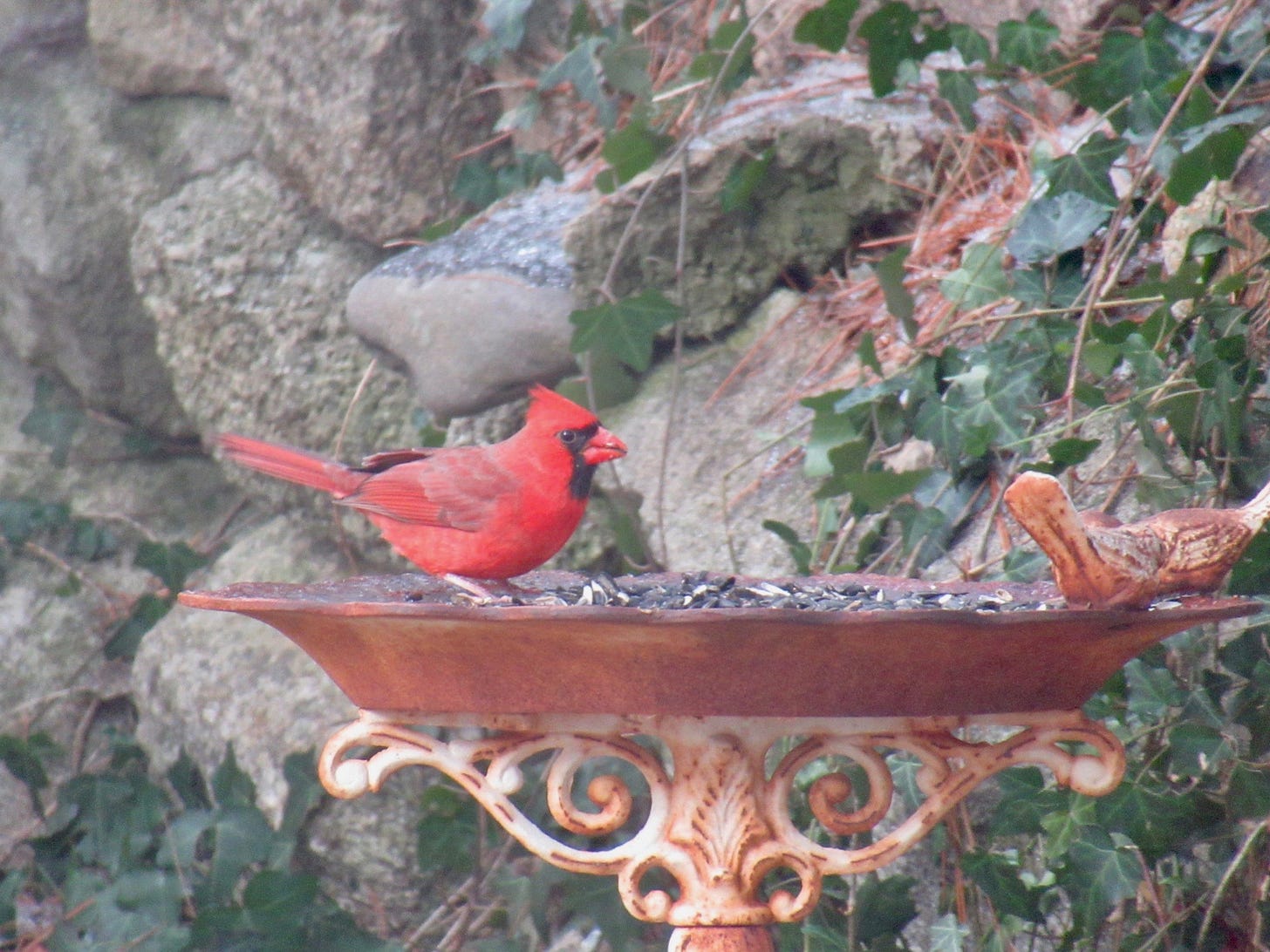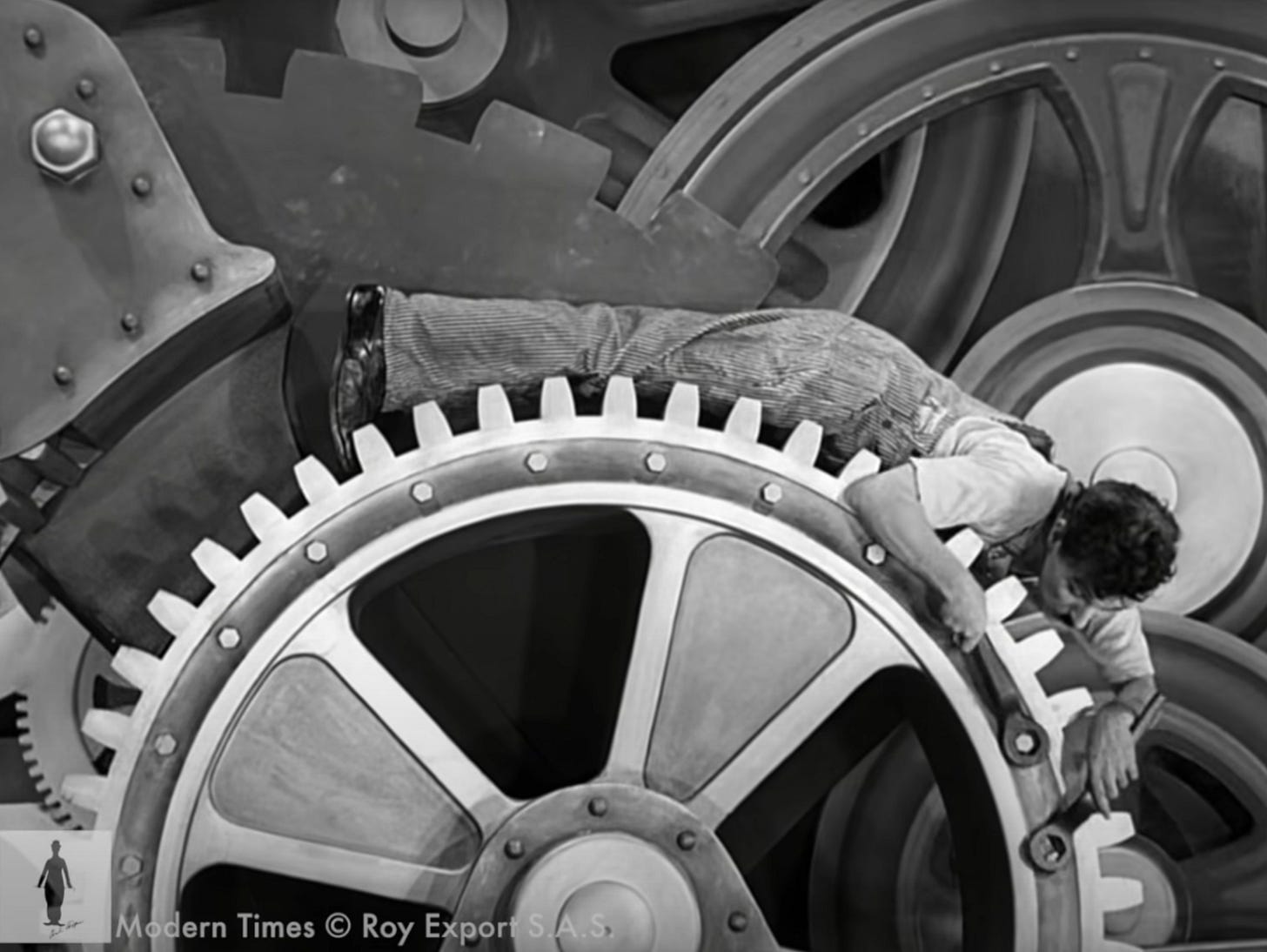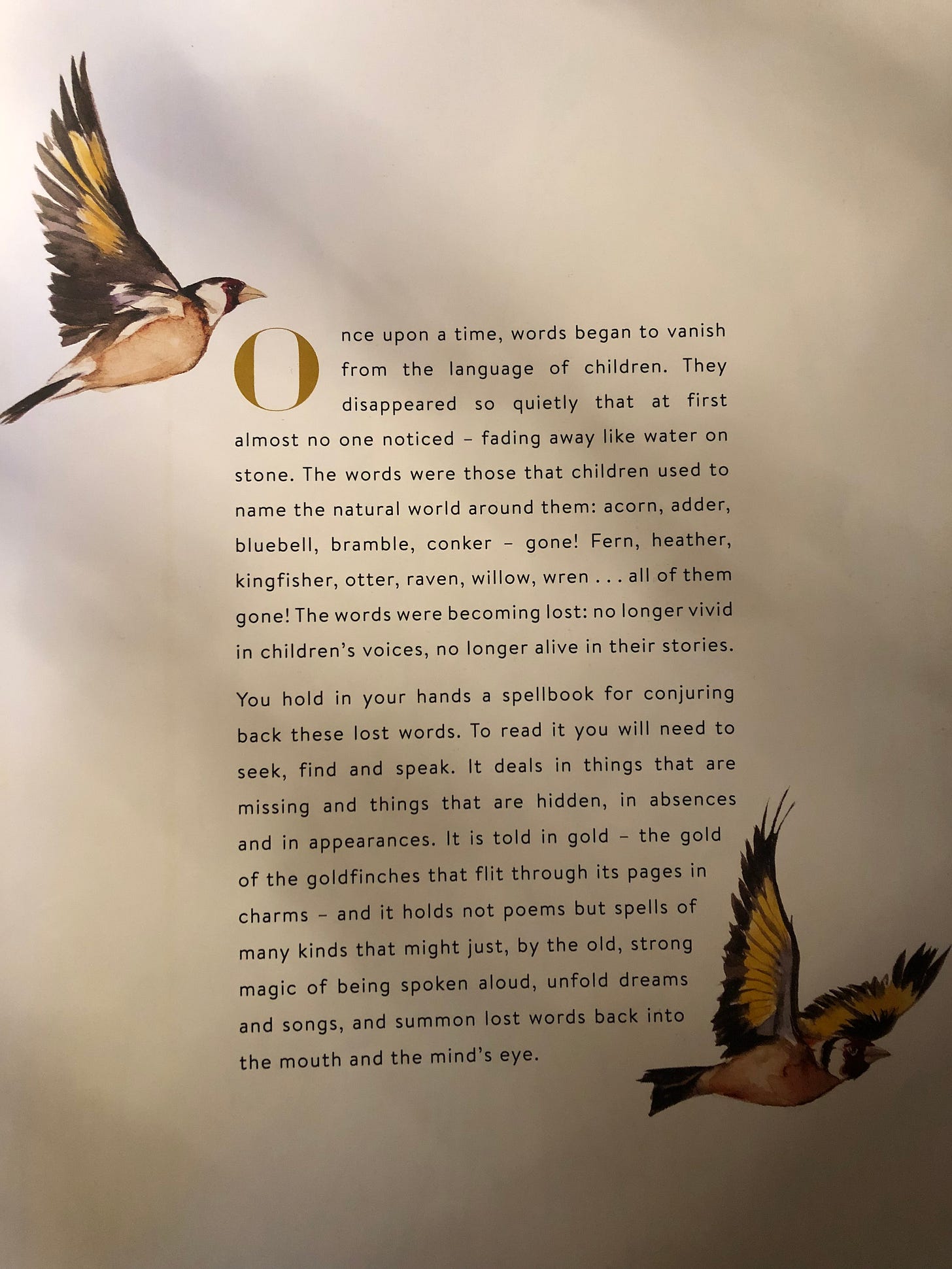“You don’t come to Lourdes for a miracle, Eileen, you come for the strength to go on when there is no miracle.” — The Miracle Club
As the light begins to return, I am finding myself at a loss for words. I very much wanted to send you all a philosophical essay that might help you to navigate these difficult times, but two things: a virus forced me to take a break and listen to my body, and second, I’m in no real position to provide any advice on how to do this. I myself am searching for new coordinates in what I find to be a very upside-down world.
In the 1936 Charlie Chaplin film Modern Times, the main character could barely keep up with the pace of production on the assembly line and literally became part of the accelerating machinery, losing his autonomy and humanity – becoming very machine-like himself in the end.
It takes a lot to resist being dehumanized by the machinery and systems that are surrounding us now. But resist we must.

The film came to mind last week when several bouts of strong wind crippled the landline and internet one day, and knocked out our power for part of another. It’s become a fairly common occurrence these days and the apparent frailty forces me to think a lot more about these systems and how we are tethered to them, but have no control over them; how we increasingly depend on them for all manner of connection, but it’s a kind of connection that isn’t providing balm for the soul.
Our systems are not designed for us—for our real human needs or those of all the other creatures that share this planet with us—but for an economic system based on the profit motive, economic growth and the transfer and concentration of wealth. We are being forced to put our eggs in a basket woven with delusions.
Connection and intimacy—which are deep human needs and have never been easy to attain—are even harder to achieve now by culture wars and fear, which social media seems to be a great conduit of. We are connected more and more through these systems, but they are doing more to separate us than to bring us together now. They don’t promote actual conversations. Actual conversations are becoming much more difficult to have, even with those closest to us. Politics and religion were always thorny subjects, but actually being impaled by one of those thorns never felt like it was a real threat. It does now.
Not everyone will agree with this statement, but I think we are connected now in ways that actually make us sick. A raft of studies are now showing that social media use—which is how many people do “connect”— has been tied to sleep issues, loneliness, depression and anxiety, and memory loss. It’s been compared to a slot machine – “when the outcome is unpredictable the behaviour is more likely to repeat.” It’s an addiction as opposed to a fulfillment of human need.
Our ways of connecting are actually dividing us.
What motivates the creation of such a system? Why are we surrounded and dependent on so many systems that are so soul crushing?
Even before Eastlink failed us, I was taking a break from the onslaught of horrific images of war that were being fed directly to me, mostly through Twitter/ X, haunting my waking and sleeping hours. Trying to process the sadness from all the images – which I could not un-see – turned me into a weepy mess. I hoped that a week or two of being unplugged would return me to myself. I suspect it will take more time.
On that blustery day when the internet and landline had been down for more than eight hours, I went outside to see my chickens. Apart from being cooped up, out of the gale force winds, the world wasn’t any different for them. With five chickens new to the flock, they were all still trying to work out their pecking order. But they had food and water and shelter. As I stood in the relative calm, some were on the roost, while others were milling about, searching the straw and wood chips for things to eat, engaging in their rhythmic scratching pattern. For my hens there is nothing better than a few grubs under an undisturbed patch of fallen leaves.
What about me? With all the stimulus and information in the world available to me, and the pressure to consume it, what is my patch of fallen leaves? What is yours? How do we return to that place in us when there’s been a disconnection?
I want to leave you with something that a good friend pointed me to last week. It might be the most beautiful project and moving piece of music that I’ve ever heard. The Lost Words Spell Songs are based on the book The Lost Words by acclaimed author Robert Macfarlane and award-winning illustrator Jackie Morris. The songs “create a listening experience that intersects music, literature, language and art, as a call to reawaken our love of the wild.”
The songs are an expression of grief that turns into love and hope. It’s what I need right now and I suspect there are others feeling the same way.
Please take a listen to The Lost Words Blessing: “Let the fern unfurl your grieving, let the heron still your breathing/ Let the selkie swim you deeper, oh my little silver-seeker/ Even as the hour grows bleaker, be the singer and the speaker/ And in city and in forest, let the larks become your chorus/ And when every hope is gone, let the raven call you home.
As the darkness recedes, I wish you all peace, love, and time truly connecting with your loved ones and with the unbelievable beauty surrounding you.
Thank you for reading and supporting my work.
Lyrics to the Lost Words Blessing… because they are stunningly beautiful, and in case you want to sing along.
The Lost Words Blessing
Enter the wild with care, my love, and speak the things you see
Let new names take and root and thrive and grow
And even as you travel far from heather, crag and river
May you like the little fisher, set the stream alight with glitter
May you enter now as otter without falter into water
Look to the sky with care, my love and speak the things you see
Let new names take and root and thrive and grow
And even as you journey on past dying stars exploding
Like the gilded one in flight, leave your little gifts of light
And in the dead of night my darling, find the gleaming eye of starling
Like the little aviator, sing your heart to all dark matter
Walk through the wild with care, my love, and sing the things you see
Let new names take and root and thrive and grow
And even as you stumble through machair* sands eroding
Let the fern unfurl your grieving, let the heron still your breathing
Let the selkie swim you deeper, oh my little silver-seeker
Even as the hour grows bleaker, be the singer and the speaker
And in city and in forest, let the larks become your chorus
And when every hope is gone, let the raven call you home
The Lost Words — A Spell Book, by Robert MacFarlane and Jackie Morris
*Correction: The original version of this post read “my hair” from lyrics I located on the internet, but a good friend pointed out that the correct word is “machair” which, he tells me, 'is a Gaelic word meaning fertile low lying grassy plain. This is the name given to one of the rarest habitats in Europe which only occurs on exposed western coasts of Scotland and Ireland. There are Machair habitats on the western shores throughout the islands.' Another friend sent me an email saying, “Machair- Noun: A type of calcerous sandy terrain formed mostly from seashells, found by the coast in areas of Scotland and Ireland.”







Last night, I listened to The Lost Words Blessing that you linked to - it is wonderful. In so many ways, many of have lost the connection to Nature and the Earth. That has all happened in a couple of generations. My grandfather was from the Isle of Man and when we used to talk about life there in the early 1900s, it was so different. Even for my mother growing up in the Thousand Islands area of Ontario, living on the water much of the time, there was such a strong connection to Nature. And people used to be more connected as well. I remember my father-in-law talking of how he and the other farmers used to share their farming equipment and have "bees" to do things at each other's farms -- raise a barn, thresh the grain, and so on.
I'm something of a fan of Nate Hagens' "The Great Simplification" video podcast -- which has the underlying theme of how a time is coming when we will have to find ways to live more connected to the land, nature and community. Last week, Bill McKibben was his guest and the latter part of the discussion was about how we have to connect once more -- and that people can't "do it all alone". I believe that to be true. People need connection on some level and that needs to be happening at the community level. And that we need to get out in nature - so that we learn to cherish and protect it.
It's interesting about social media. By coincidence, I and a few of my "widow friends" discussed this very topic on Facebook about 3 days ago. We got to talking about how different things are now for all of us than when we were first widowed. I have been alone for most of 16 years now. When Don died, I knew of no one in my community who was widowed in their early 50s. I was very much alone and people actually avoided me -- people I had worked on projects with in the agricultural community. It was incredibly weird and lonely. I decided to just leave in my van with my elderly dog and start traveling. At that time, I didn't use Facebook, but I had a blog. Somehow, a few months after I set out, I somehow found a couple of other widows who were blogging. We visited each others' blogs each day and left comments. Our numbers gradually grew over the next couple of years as more of us found each other. Then we started to connect using Facebook.
There is quite a network of us who are "widda friends" who met online and some have met IRL as well over the years. We all keep in touch. Many of the friends who comment on my FB posts are my widowed friends. Some are "new widows" who have just lost their partners over the past year or two. Our numbers are growing. We all post to each other on Facebook almost daily. We are there for each other in ways that no one else can be there for us. The non-widowed don't understand us -- they are dismissive and sometimes angry at us for not hurrying up to get back to normal. We are pretty much in agreement that social media has kept us alive -- helped keep us from giving up -- probably prevented many suicides -- given the newly widowed hope that they can survive. I think there are similar communities - people who have chronic illnesses - I have friends who network with others who have the same illnesses -- I've used those support systems as a caregiver to family and friends with cancer, and some very obscure auto-immune disorders where medical specialists actually hang out with patients and caregivers to discuss treatments, research, and so on. But, yes, I know that there are some very serious downsides to social media and the internet in general. Some of it alarms me greatly. I don't know how the bad can be avoided -- other than to avoid those toxic areas of the internet. Sometimes I just have to withdraw.
I hope you are feeling better soon -- that you are getting rest and spending time outdoors and doing some of the "connecting" with nature. Best wishes to you in the coming year. Let us hope that mankind comes to its senses and that peace will prevail. Take care.
Deleting my facebook account over a month ago has been one of the best actions for my sanity that I've taken in 2023. While I was worried I would feel disconnected from 'everything' going on and 'everyone' that I know, I actually don't. While I am not suggesting that this is a move everyone should take, it is a move I needed to make. Wishing you lightness of being in this coming year. ruth